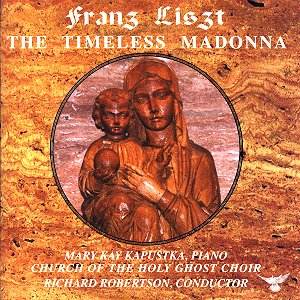Comparison recordings: Hungarian State Chorus, conducted
by Gábor Ugrin. Hungaroton HCD 31103 (S20, 56, 39, 34/1) [DDD]
The first time I heard the Gounod Ave Maria
played on the organ I was 8 years old and I thought the music was so
beautiful and mysterious. Never mind that it was a mechanical organ
at a museum that had once been the home of a very rich man. But surely
a CD entirely of Ave Marias will have a limited audience today?
Some Buddhists or Muslims might be moved to feel pity that anyone could
be so misguided, but many fundamentalist Christians might even become
angry at what they would consider gross Paganism. During Liszt’s lifetime
his religiosity was assumed by his more severe critics to be a pose
and an imposture designed to deceive. Perhaps you recall in the "Wagner"
movie, Richard Burton in the character of Wagner says of Liszt something
like: "The life he’s led! And now he wants to play me his latest
Ave Maria!" The accompanying gesture is one of amazement
and disgust.
But Liszt was unusual precisely because he did truly
believe. Through his music Liszt conversed directly with God and he
had no patience for human rules, formulas, church bureaucrats, or bad
music hiding behind sacred words. When in Rome he would drop in on his
old buddy the Pope and chat with him as with any friend — and usually
play the piano, and for that piano playing even the Pope would put up
with anything. Cheerful words and a slap on the back were good enough
for the Pope, and Liszt’s Ave Marias are good enough music to
merit the attention of the ghosts of Wesley and Calvin as well as of
atheists and agnostics who love music.
After all, Christians listen to masses by atheists
like Berlioz and Vaughan Williams, as well as the oratorios of the Jewish
Handel and Mendelssohn. Music is more sacred than religion. Religion
has always sought to absorb music because it envies it that sacredness.
And this disk is a musical journey in the company of one who has seen
many beautiful things and wants to share them with us as clearly as
possible. That applies not only to Liszt but also to the guiding spirit
behind this production, Ms. Mary Kay Kapustka who plays the piano arrangements
which make up much of this CD. Her playing lacks the fleetness, polish,
and grace of Horowitz, but no-one plays this music with more sincerity
or commitment. The chorus sings effectively and clearly without excesses
of any kind. This is a statement of music by a religious man, not a
sectarian service, and as such its appeal is universal, as was, for
example, a recent similar album by the "Anonymous 4."
The Hungarians, to whose fervent Catholicism the religious
music of Liszt has always appealed, in their recording, use a larger
chorus and sing with more Old World religiosity and with a more reverberant
setting, which means the musical lines are not quite so clear although
the drama and passion are stronger. Their timings are actually very
slightly less than the Denverites. Your choice.
Paul Shoemaker

